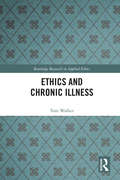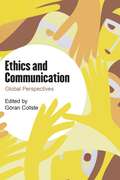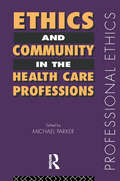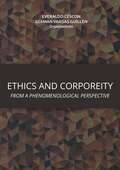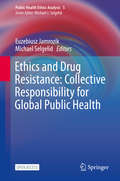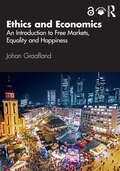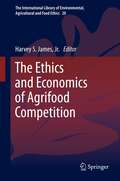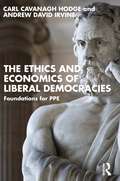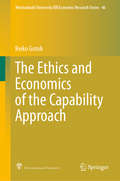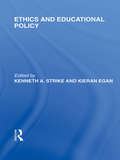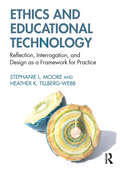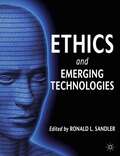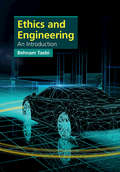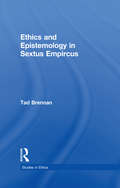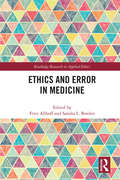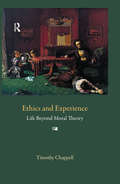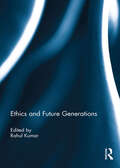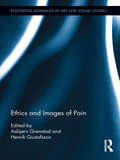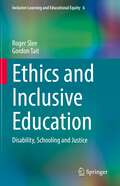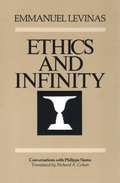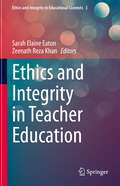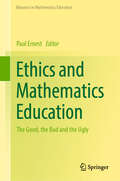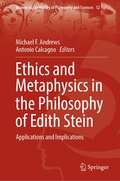- Table View
- List View
Ethics and Chronic Illness (Routledge Research in Applied Ethics)
by Tom WalkerThis book provides an account of the ethics of chronic illness. Chronic illness differs from other illnesses in that it is often incurable, patients can live with it for many years, and its day-to-day management is typically carried out by the patient or members of their family. These features problematise key distinctions that underlie much existing work in medical ethics including those between beneficence and autonomy, between treatment and prevention, and between the recipient and provider of treatment. The author carries out a detailed reappraisal of the roles of both autonomy and beneficence across the different stages of treatment for a range of chronic illnesses. A central part of the author’s argument is that in the treatment of chronic illness, the patient and/or the patient’s family should be seen as acting with healthcare professionals to achieve a common aim. This aspect opens up unexplored questions such as what healthcare professionals should do when patients are managing their illness poorly, the ethical implications of patients being responsible for parts of their treatment, and how to navigate sharing information with those directly involved in patient care without violating privacy or breaching confidentiality. The author addresses these challenges by engaging with philosophical work on shared commitments and joint action, responsibility and justice, and privacy and confidentiality. The Ethics of Chronic Illness provides a new, and much needed, critical reappraisal of healthcare professionals’ obligations to their patients. It will be of interests to academics working in bioethics and medical ethics, philosophers interested in the topics of autonomy, responsibility, and consent, and medical practitioners who treat patients with chronic illness.
Ethics and Communication: Global Perspectives
by Göran Collste<p>How can ethics be communicated in an age of globalisation? Is it possible to overcome cultural differences and agree on common values and principles that cross cultural borders? How does globalisation challenge ethics and established moral traditions? How are human rights justified in a global context? <p>This timely collection of essays responds directly to these questions. An international team of contributors pursue issues in ethics, information and communication that include both the classical question of the universality/contextuality of ethics and values, but also new challenges for communication relating to how values and norms are communicated and shared across cultural and political borders. The essays in this book explore theoretical questions of global ethics and ethical universalism, ethics and communication with reference to specific world views and religions, and the challenge of globalisation for ethical communication in particular social arenas. </p>
Ethics and Community in the Health Care Professions (Professional Ethics)
by Michael ParkerThe concept of community is increasingly the focus of political argument in Britain, the United States and elsewhere around the world. The sense people have of belonging to coummunities provides a powerful motivation which continues to affecct the political and social face of the world. Recently, debate about the relationship between individuals and their communities has become central to the making of both, American and European social policy. In the United Kingdom this is especially apparent in the area of health care, where ideas of community have informed recent legislation concerning community care, community health trusts and the Children Act among others. This volume explores the focus of interest in community and the emerging theoretical oppostion between communitarianism and liberalism, as well as the practical, theoretical and ethical issues relating to community in the health care professions, including a discussion of the health service as Civil Association, an analysis of liberal and communitarian views on the allocaiton of health care resources, an exploration of the use of genetic information and an examination of health care decision making for incapacitated elderly patients.
ETHICS AND CORPOREITY FROM A PHENOMENOLOGICAL PERSPECTIVE
by Everaldo Cescon Germán Vargas GuillénThe approach to the theme of the body within the framework of phenomenology is developed in 20th century France. Despite the evident Cartesianism, it is there that the principles of a phenomenology of the body are configured, in the confluence between the phenomenological tradition and the philosophy of existence. The systematic development of the phenomenology of the body, which takes centered reflection on the corporeal existence and the incarnated subject, corresponds, among others, to Gabriel Marcel, Jean-Paul Sartre, Maurice Merleau-Ponty and Bernhard Waldenfels. The phenomenology of the body opens a new horizon to understand the corporeal dimension of human existence and offers a new philosophical view of the body, while the body is not only an observable reality as an object, but it is a dimension of the being itself, as, according to Merleau-Ponty, from the phenomenology of “corporeal existence”, the body is the “medium” of our “being-in-the-world”. That is precisely why it can be radically said that “being-in-the-world” (Heidegger) is primarily a “corporal-being-in-the-world" (Waldenfels). This implies “belonging to the world”, being “implicated” in the world through the body and, also, that the body opens a subject to the world. The phenomenology of the body sought to restore the unity of human existence. Husserl, Scheler, Marcel, Merleau-Ponty, Sartre, Waldenfels, among others, break with the modern mechanistic conception of the body and resignify subjectivity and objectivity, in open opposition to the dualistic tradition. The phenomenology of corporeal existence makes the body our way-to-be-in-the-world. The body not only ceases to be an object, but also a passive structure, receiving a reality configured by the confines of res cogitans. Based on Husserl, a theory of the phenomenological body is developed, which will reverse the subordinate role that the body had in Cartesian thought. Merleau-Ponty, who t
Ethics and Drug Resistance: Collective Responsibility for Global Public Health (Public Health Ethics Analysis #5)
by Euzebiusz Jamrozik Michael SelgelidThis Open Access volume provides in-depth analysis of the wide range of ethical issues associated with drug-resistant infectious diseases. Antimicrobial resistance (AMR) is widely recognized to be one of the greatest threats to global public health in coming decades; and it has thus become a major topic of discussion among leading bioethicists and scholars from related disciplines including economics, epidemiology, law, and political theory. Topics covered in this volume include responsible use of antimicrobials; control of multi-resistant hospital-acquired infections; privacy and data collection; antibiotic use in childhood and at the end of life; agricultural and veterinary sources of resistance; resistant HIV, tuberculosis, and malaria; mandatory treatment; and trade-offs between current and future generations. As the first book focused on ethical issues associated with drug resistance, it makes a timely contribution to debates regarding practice and policy that are of crucial importance to global public health in the 21st century.
Ethics and Economics: An Introduction to Free Markets, Equality and Happiness
by Johan GraaflandThis textbook applies economic ethics to evaluate the free market system and enables students to examine the impact of free markets using the three main ethical approaches: utilitarianism, principle-based ethics and virtue ethics. Ethics and Economics systematically links empirical research to these ethical questions, with a focus on the core topics of happiness, inequality and virtues. Each chapter offers a recommended further reading list. The final chapter provides a practical method for applying the different ethical approaches to morally evaluate an economic policy proposal and an example of the methodology being applied to a real-life policy. This book will give students a clear theoretical and methodological toolkit for analyzing the ethics of market policies, making it a valuable resource for courses on economic ethics and economic philosophy.
Ethics and Economics: An Introduction to Free Markets, Equality and Happiness
by Johan GraaflandThis textbook applies economic ethics to evaluate the free market system and enables students to examine the impact of free markets using the three main ethical approaches: utilitarianism, principle-based ethics and virtue ethics.Ethics and Economics systematically links empirical research to these ethical questions, with a focus on the core topics of happiness, inequality and virtues. Each chapter offers a recommended further reading list. The final chapter provides a practical method for applying the different ethical approaches to morally evaluate an economic policy proposal and an example of the methodology being applied to a real-life policy.This book will give students a clear theoretical and methodological toolkit for analyzing the ethics of market policies, making it a valuable resource for courses on economic ethics and economic philosophy.The Open Access version of this book, available at http://www.taylorfrancis.com, has been made available under a Creative Commons Attribution-Non-Commercial (CC-BY-NC) 4.0 license.
The Ethics and Economics of Agrifood Competition
by Harvey S. James Jr.This edited volume presents ethical and economic analyses of agrifood competition. By systematically examining fairness and openness in agricultural markets, it seeks to answer the question of whether there is adequate competition in the agrifood industry and whether the system is fair to all participants. It outlines ethical and economic principles important for understanding agrifood competition, presents arguments for and against consolidation, globalization and the integration of agrifood industries, and looks at the implications of globalization on the nature of competition in specific agricultural contexts.
The Ethics and Economics of Liberal Democracies: Foundations for PPE
by Carl Cavanagh Hodge Andrew David IrvineRarely in the short history of liberal-democratic government has a primer on basic liberal-democratic values and institutions been more needed than now. Popular discontent, even anger, with democratic governments has grown steadily over the past twenty years. Not since the 1930s have citizens and their elected officials been so baffled about their respective roles in the maintenance of both democratic governments and liberal economies. This book attempts to address this growing need. Especially written as a primer for courses in Philosophy, Politics and Economics (PPE), it has introductory chapters on all three main disciplines. It also has chapters on the rule of law and on three important public-policy areas – Corruption, Climate and Civil Society. Individual topics discussed include free and fair elections, populism, responsible government, republican and Westminster systems of government, regulated free markets, the Great Recession of 2008, globalization, greenwashing, identity politics, academic freedom, utilitarianism, social contract theory, positive and negative liberty, and the good life.Historically informed, The Ethics and Economics of Liberal Democracies: Foundations for PPE is sure to be of interest to students who are interested in public-policy work, as well as those who are interested in both the theory and practice of democratic government.Key Features: Written especially for PPE (Philosophy, Politics and Economics) courses and students Focuses on the key values and institutions of modern democracies Includes chapters on both the theory and practice of democratic government and public-policy work Provides a comprehensive glossary of relevant terms from all three disciplines
The Ethics and Economics of the Capability Approach (Hitotsubashi University IER Economic Research Series #46)
by Reiko GotohThis book inquires into the Capability Approach, a value theory of freedom, which crystalizes the interests of Marx, Welfare Economics, Social Choice, and Ethics. The capability approach has attracted many people as a promising interdisciplinary approach to human well-being and social worlds, finely overarching ethical and economic concerns. It has well challenged essential characteristics of welfare economics, which focuses on the criterion of efficiency with the concept of utility, by explicitly incorporating normative criteria such as agency, well-being and real freedom into positive analysis. However, it has a bit operational and methodological difficulties such that how to estimate an individual capability set which includes potential multi-dimensional functioning vectors. This book reminds the reader of what traditional economics has left behind, by examining historical backgrounds, scrutinizing philosophical foundations and providing an operational formulation of the capability approach: indispensable for understanding what the capability approach is about and what it can achieve.
Ethics and Educational Policy (International Library of the Philosophy of Education Volume 21)
by Kenneth A. StrikeThis is a philosophical treatment of the conceptual and normative aspects of topics which are currently a matter of policy debate in education. The authors have focussed on such concepts as liberty, autonomy, equality and pluralism, and have provided a philosophical commentary which relates these concepts both to a background of philosophical literature, and to the institutional contexts and policy debates in which they function. The book will be of significance to all policy makers who need to gain an understanding of the values and concepts involved in major policy problems.
Ethics and Educational Technology: Reflection, Interrogation, and Design as a Framework for Practice
by Stephanie L. Moore Heather K. Tillberg-WebbEthics and Educational Technology explores the creation and implementation of learning technologies through an applied ethical lens. The success of digital tools and platforms in today’s multi-faceted learning and performance contexts is dependent not only on effective design and pedagogical principles but, further, on an awareness of these technologies’ interactions with and implications for users and social systems. This first-of-its-kind book provides an evidence-based, process-oriented model for ethics in technology-driven instructional design and development, one that necessitates intentional reflective practice, a critical and theoretically informed interrogation of technology, and a participatory approach to technology design and applications. Rich with real-world ethics examples and design cases, supported by reflection questions and applied activities, and attentive to ethical codes among preeminent educational technology organizations, this is an ideal resource for students, faculty, researchers, and professionals across educational technology, instructional design, learning sciences, learning engineering, organizational training, and other disciplines.
Ethics and Emerging Technologies
by Ronald SandlerFirst and only undergraduate textbook that addresses the social and ethical issues associated with a wide array of emerging technologies, including genetic modification, human enhancement, geoengineering, robotics, virtual reality, artificial meat, neurotechnologies, information technologies, nanotechnology, sex selection, and more.
Ethics and Engineering: An Introduction (Cambridge Applied Ethics)
by Behnam TaebiThe world population is growing, yet we continue to pursue higher levels of well-being, and as a result, increasing energy demands and the destructive effects of climate change are just two of many major threats that we face. Engineers play an indispensable role in addressing these challenges, and whether they recognize it or not, in doing so they will inevitably encounter a whole range of ethical choices and dilemmas. This book examines and explains the ethical issues in engineering, showing how they affect assessment, design, sustainability, and globalization, and explores many recent examples including the Fukushima Daiichi nuclear disaster, Dieselgate, 'naked scanners' at airports, and biofuel production. Detailed but accessible, the book will enable advanced engineering students and professional engineers to better identify and address the ethical problems in their practice.
Ethics and Enjoyment in Late Medieval Poetry
by Jessica RosenfeldJessica Rosenfeld provides a history of the ethics of medieval vernacular love poetry by tracing its engagement with the late medieval reception of Aristotle. Beginning with a history of the idea of enjoyment from Plato to Peter Abelard and the troubadours, the book then presents a literary and philosophical history of the medieval ethics of love, centered on the legacy of the Roman de la Rose. The chapters reveal that 'courtly love' was scarcely confined to what is often characterized as an ethic of sacrifice and deferral, but also engaged with Aristotelian ideas about pleasure and earthly happiness. Readings of Machaut, Froissart, Chaucer, Dante, Deguileville and Langland show that poets were often markedly aware of the overlapping ethical languages of philosophy and erotic poetry. The study's conclusion places medieval poetry and philosophy in the context of psychoanalytic ethics, and argues for a re-evaluation of Lacan's ideas about courtly love.
Ethics and Epistemology in Sextus Empircus (Studies in Ethics)
by Tad BrennanThis book defends the consistency, plausibility, and interest of the brand of Ancient Skepticism described in the writings of Sextus Empiricus (c. 150 AD), both through detailed exegesis of the original texts, and through sustained engagement with an array of modern critics.
Ethics and Error in Medicine (Routledge Research in Applied Ethics)
by Fritz Allhoff Sandra L. BordenThis book is a collection of original, interdisciplinary essays on the topic of medical error. Given the complexities of understanding, preventing, and responding to medical error in ethically responsible ways, the scope of the book is fairly broad. The contributors include top scholars and practitioners working in bioethics, communication, law, medicine and philosophy. Their contributions examine preventable causes of medical error, disproportionate impacts of errors on vulnerable populations, disclosure and apology after discovering medical errors, and ethical issues arising in specific medical contexts, such as radiation oncology, psychopathy, and palliative care. They also offer practical recommendations for respecting autonomy, distributing burdens and benefits justly, and minimizing injury to patients and other stakeholders. Ethics and Error in Medicine will be of interest to a wide range of researchers, students, and practitioners in bioethics, philosophy, communication studies, law, and medicine who are interested in the ethics of medical error.
Ethics and Experience: Life Beyond Moral Theory
by Tim Chappell"Ethics and Experience" presents a wide-ranging and thought-provoking introduction to the question famously posed by Socrates: How is life to be lived? 'An excellent primer for any student taking a course on moral philosophy, the book introduces ethics as a single and broadly unified field of inquiry in which we apply reason to try and solve Socrates' question. "Ethics and Experience "examines the major forms of ethical subjectivism and objectivism - including expressivism, error theory', naturalism, and intuitionism. The book lays out the detail of the most significant contemporary moral theories - including utilitarianism, virtue ethics, Kantianism, and contractarianism - and reconsiders these theories in the light of two questions that should perhaps be asked more often: Is moral theory, with its tendency to regiment ethical thought and experience, really the best way for us to apply reason to deciding how to live? And, might it not be more truly reasonable to look for less system and more insight?
Ethics and Future Generations
by Rahul KumarExisting human beings stand in a unique relationship of asymmetrical influence over future generations. Our choices now can settle whether there are any human beings in the further future; how many will exist; what capacities and abilities they might have; and what the character of the natural world they inhabit is like. This volume, with contributions from both new voices and prominent, established figures in moral and political philosophy, examines three generally underexplored themes concerning morality and our relationship to future generations. First, would it be morally wrong to allow humanity to go extinct? Or do we have moral reasons to try and ensure that humanity continues into the indefinite future? Second, if humanity is to continue into the future, how many people should there be? And is it morally important whether they have lives that are of high quality or are just barely worth living? And third, how can we best make sense of the intuitive idea that by not taking action on climate change and preserving natural resources, we are in some way wronging future generations? This book was originally published as a special issue of the Canadian Journal of Philosophy.
Ethics and Images of Pain (Routledge Advances in Art and Visual Studies)
by Asbjørn Grønstad Henrik GustafssonFew phenomena are as formative of our experience of the visual world as displays of suffering. But what does it mean to have an ethical experience of disturbing or traumatizing images? What kind of ethical proposition does an image of pain mobilize? How may the spectator learn from and make use of the painful image as a source of ethical reflection? Engaging with a wide range of visual media--from painting, theatre, and sculpture, to photography, film, and video--this interdisciplinary collection of essays by leading and emerging scholars of visual culture offers a reappraisal of the increasingly complex relationship between images of pain and the ethics of viewing. Ethics and Images of Pain reconsiders the persistent and ever pertinent nexus of aesthetics and ethics, the role of painful images as generators of unpredictable forms of affect, the moral transformation of spectatorship, the ambivalence of the witness and the representation of afflication as a fundamental form of our shared scopic experience. The instructive and illuminating essays in the collection introduce a phenomenological context in which to make sense of our current ecology of excruciating images, one that accentuates notions of responsibility, empathy, and imagination. Contributors trace the images of pain across a miscellany of case studies, and amongst the topics addressed are: the work of artists as disparate as Doris Salcedo, Anselm Kiefer and Bendik Riis; photographs from Abu Ghraib and Rwanda; Hollywood war films and animated documentaries; performances of self-immolations and incidents of police brutality captured on mobile phones.
Ethics and Inclusive Education: Disability, Schooling and Justice (Inclusive Learning and Educational Equity #6)
by Roger Slee Gordon TaitThis book reveals the entanglement of ethics, rights and justice in education. It aims to develop everyday philosophy to guide choices as we continue to attempt to make schools places for all comers. The authors offer education as a social good, a building block for inclusive communities. This assumes an ethical predisposition. Ethics and inclusive education takes the reader on a journey through the conceptual foundations of ethics, rights and justice to assist us to build a formulation of the fair or just society and the way ethical approaches to schooling may support or unravel that.
Ethics and Infinity
by Emmanuel LevinasLevinas brings together the phenomenology of Husserl, the fundamental ontology of Heidegger, and the Bible. This book highlights his modesty and reserve and, above all, his rigor. It is the best introduction to his work. Chapters Include: Bible and Philosophy; Heidegger; The 'There Is'; The Solitude of Being; Love and Filiation; Secrecy and Freedom; Responsibility for the Other; The Glory of Testimony; The Hardness of Philosophy and the Consolations of Religion. Translated from the French by Richard Cohen.
Ethics and Integrity in Teacher Education (Ethics and Integrity in Educational Contexts #3)
by Sarah Elaine Eaton Zeenath Reza KhanThis book addresses issues related to ethics and integrity in teacher training. Authors pay special attention to the role ethics plays in teaching practice and the importance of establishing expectations for students to learn with integrity from a young age. The book celebrates global perspectives on ethics and integrity for pre-service teachers, acknowledging that although some aspects of ethics are universal, the ways in which these are implemented can vary. Contributors present original research, case studies, and recommendations for practice and teaching. The book draws on a range of theoretical and conceptual foundations including applied ethics, academic integrity, and moral education.
Ethics and Mathematics Education: The Good, the Bad and the Ugly (Advances in Mathematics Education)
by Paul ErnestThis edited volume is an inquiry into the ethics of mathematics education, and to a lesser extent, the ethics of mathematics. The imposition of mathematics for all raises questions of ethics. What are the ethics of teaching school mathematics? What are the costs as well as the benefits? What are the ethical issues raised by the official aims of mathematics teaching, the planned curriculum, the pedagogies employed in school and college mathematics and the assessment systems? These questions are addressed in the book as well as what systems of ethics we might use. The volume ventures into a burgeoning new field. It offers a unique set of investigations, both theoretical and in terms of practices. It announces the ethics of mathematics education as a new subfield of research and includes valuable contributions from many of the best-known researchers in mathematics education; additionally, it is a valuable resource for students, teachers and researchers in the field. This is an enduring and classic source book in the field. From the wisdom of leading scholars to the little heard voices of students, this collection offers the reader many striking new insights into the ethics of mathematics and education.
Ethics and Metaphysics in the Philosophy of Edith Stein: Applications and Implications (Women in the History of Philosophy and Sciences #12)
by Antonio Calcagno Michael F. AndrewsThis book is dedicated to Edith Stein (1891–1942), who is known widely for her contributions to metaphysics. Though she never produced a dedicated work on questions of ethics, her corpus is replete with pertinent reflections. This book is the first major scholarly volume dedicated to exploring Stein’s ethical thought, not only for its wide-ranging content, from her earlier to later works, but also for its applications to such fields as psychology, theology, education, politics, law, and culture. Leading international scholars come together to provide a systematic account of Stein’s ethics, highlighting its relation to Stein’s highly developed and complex metaphysics. Questions about the good, evil, the rights and ethical comportment of the person, the state, and feminism are addressed. The book appeals to scholars interested in the history of philosophical and ethical thought
